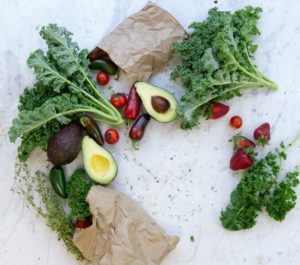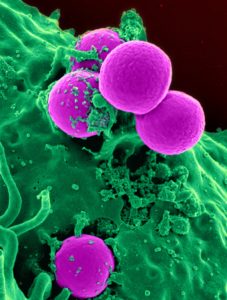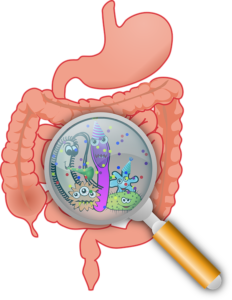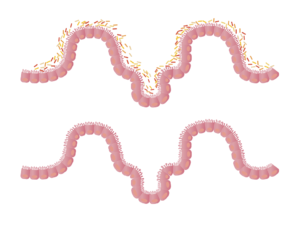Gut Bacteria and Weight Gain.
We’ve all been there: We do what we can to lose weight but then sadly, don’t get the results we are after.
It is now known that the bacteria in your gut can be making you fat.
In other words, there could be a link between the bacteria in your gut and your weight gain.
You see, scientists fattened germ-free mice with ‘obese’ human gut microbes. Results confirmed that the gut microbiome plays a part in weight regulation..
Typically the human gut contains around 37 trillion microbes – and that’s a lot!
Most healthy individuals have their own unique combination of bacterial species, known as their own microbiome. You can read more about the Microbiome here.
If there is a reduction or disturbance of this core bacteria, then it can change from a healthy gut bacterial balance or microbiome to dysbiosis.
(Dysbiosis is the term used to describe an unhealthy gut environment).
Constant low-grade inflammation then results, as well as a faulty barrier lining the gut.
What then happens is that unwanted molecules cross this barrier and get into the rest of our bodies. This is where the term ‘leaky gut’ comes from.
These actions can affect many body systems and gradually lead to a variety of diseases.
It has been found that obese patients tend to have a lower variety of microbes, which may interfere with important bacterial functions.
Why is a healthy gut bacterial balance (or healthy microbiome) important?
Because the gut microbiome is a balance of organisms that communicates far beyond the bowels to influence body composition, appetite, and feeling full.
Evidence is now revealing that your gut bacteria need to be healthy because it dictates how your body regulates and maintains its weight!
Your Healthy Gut Bacteria can cause Weight Loss
The fact that Healthy Gut Bacteria can cause Weight Loss, is shown by clear trends show that the gut bacteria in a lean person is different from that in an overweight person.
A healthy gut microbiome in a lean individual is seen as having a diverse range of beneficial bacteria, with very few ‘bad’ bacteria to disrupt the health of the gut.
Once the gut microbiome is in this healthy state, these good bacteria send messages to the body to maintain its weight within a healthy range.
So it makes sense to learn how to increase good bacteria in the gut naturally, because
This improves your overall gut health and could prevent weight gain.
On the other hand, the gut bacteria in an overweight person is often shown to have less of these good bacteria and more of the bad bacteria.
When out of balance, gut bacteria begin to act differently.
They take more calories from food, store more energy as fat, and set off inflammation within the gut itself.
All of these factors lead to the body storing more fat, especially around the waist (this fat is known as visceral fat).

Confused because you can’t lose weight? then check your gut health!
Which Gut Bacteria cause weight loss?
Researchers found a specific strain of probiotic helped offset the effects of eating a high-fat diet, reducing weight gain.
They also found a reduction in toxins generated in the gut that can cross the gut barrier when it is ‘leaky’.
This means systemic inflammation is not an issue.
Of interest is that obesity and weight gain are strongly associated with increased risks of cardiovascular disease, metabolic syndrome, and type 2 diabetes.
These diseases have all been linked to dysbiosis.
Findings show the specific effects of specific strain of probiotic help normalize a healthy appetite and prevent insidious weight gain.
Besides this, the probiotic strains trialed in metabolic syndrome patients led to the benefits of mildly reduced body weight, significantly reduced inflammation, improved total cholesterol, and low-density lipoprotein (LDL).
These findings point to the specific effects of the specific strain of probiotic in normalizing a healthy appetite and preventing weight gain.

A whole food diet encourages a healthy microbiome
Gut Microbiomes Love a Healthy Lifestyle!
More good news is that our microbiome responds positively to whole foods, regular sleep, and physical activity, all of which support healthy body weight regulation.
For instance, a plant-rich diet delivers prebiotic fibres.
Even though we do not use this for food, these prebiotic fibres which are non-soluble encourage bacterial diversity, resilience, and healthy symbiosis in the colon.
Prebiotic fibres also contribute to a healthy weight by helping us feel satisfied after eating.
Research demonstrates better weight loss and metabolic outcomes in type 2 diabetics when consuming diverse carbohydrates and fibres in the diet.
Like us, our microbes also need rest and routine!
Gut organisms exhibit daily rhythms influenced by feeding and produce measurable differences throughout the day.
For instance, microbes engage in digestion and metabolism during feeding, and between meals they repair, regenerate and detoxify.
Microbial molecular clocks are so sensitive to our feeding and sleeping rhythms that even common jet lag can induce dysbiosis. This is enough to affect glucose intolerance and cause weight gain.
This points to the importance of regular sleep and eating patterns to maintain a healthy gut and waistline.

A good night’s sleep helps reduce weight-promoting inflammation.
Support Your Microbiome to help you lose weight
Now that you know your gut health can affect your weight, we can aim for healthy gut bacteria by:
– the use of strain-specific probiotic therapy,
– along with fewer calories,
– prebiotic-rich whole foods,
– enough sleep,
– as well as exercise
These can all help minimize food cravings during weight loss.
Besides this, these strategies support gut microbiome resilience.
This helps protect against obesity and other inflammatory diseases, including depression and osteoarthritis.
Whilst obviously a complex topic, you don’t need to navigate this alone.
Talk to our Naturopath at Your Wellness Centre to find the best Weight Management Program.
One that provides a comprehensive solution that can be tailored to your personal needs.
A program that addresses all the elements that can help support a healthy gut microbiome, and lower your metabolic body weight set-point.
That way, you can lose weight without feeling hungry and, most importantly, keep it off for the long term.
Meanwhile, you can start your journey toward better body composition today by following these guidelines.
5 Tips to Support Your Weight loss goals
Besides probiotics, employing key diet and lifestyle strategies are also important to maintaining ideal body composition:
1. Regular exercise
These can include various forms of movement including walking, yoga, swimming, and weights. This helps to burn fat for energy and can reduce high levels of hormones (such as adrenaline) that promote weight gain.
2. Eat a wholefood diet
Filling up on fruits, vegetables, lean meats, legumes, and healthy fats helps to naturally regulate your appetite and curb cravings. As a bonus, high fibre foods are the favourite fuel source of your good bacteria!
3. Avoid processed sugar and processed fats
Excess calories from these sources are stored as fat, especially around your waistline. They also encourage dysbiosis within your digestive tract.
4. Hydration
Plenty of water actually increases your energy levels and metabolism and is vital for proper waste elimination.
5. Adequate sleep
Eight hours per night is needed for a reason!
It resets and balances the hormones required for a healthy metabolism and reduces weight-promoting inflammation.
With the best approach to weight management being a holistic one, consider your microbiome alongside a sustainable diet and lifestyle.
Include exercise and sleep to comprehensively prevent gaining unwanted fat by reducing cravings, losing fat, maintaining muscle mass, and increasing your metabolism!
Besides this, improving the health of your microbiome, will turn your gut into a weight management machine and help to keep your waistline healthy!














